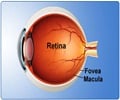Eye surgeons may soon be able to restore sight to some blind people - by giving them a retinal transplant.
Retinal transplant seems to be the new buzzword doing the rounds in medical circles nowadays after eye surgeons asserted that they may be able to restore sight to some blind people with such a transplant mechanism.
Preliminary research has shown encouraging results with transplantation of retinal cells in patients with blindness caused by retinitis pigmentosa (RP) and age-related macular degeneration (AMD).In the study, Dr. Norman D. Radtke of University of Louisville, Kentucky, lead author of the study and colleagues performed the experimental transplant procedure in ten patients with vision loss resulting from retinal degeneration.
Each of the patients in the trial received a small 4-millimetre square of retinal tissue, complete with retinal progenitor cells and the retinal pigment epithelium that nourishes them.
The tissues were placed in the sub-retinal space beneath the fovea, the area of the retina responsible for sharp central vision.
The researchers found that seven of the subjects experienced an improvement in their visual acuity.
The results of phase II trial may seem to boost the chances of restoring vision in sufferers of RP and AMD but it is far from clear just how much hope this research really offers.
He said that one reason is the fact that the transplanted tissue is obtained from aborted fetuses.
There simply wouldn't be enough donors available, and the logistics of getting the ethical approval to use them would act as a major barrier to treatment, Zarbin added.
Another concern is the efficacy of the procedure. Despite 20 years of research on animals, by co-authors Robert Aramant at research firm Ocular Transplantation, also in Louisville, and Magdalene Seiler at the University of California, Irvine, there is still no clear evidence that the improved vision in humans is directly due to the transplanted photoreceptor cells replacing the function of host cells within the retina.
And major issue is that the improved visual acuity seems to only last for a couple of years.
Zarbin said that the real value of this trial is the demonstration that cells can be placed in the sub-retinal space without any adverse reaction.
This holds promise for other possible forms of cell-based treatment currently being explored, such as introducing stem cells into the retina and getting them to differentiate into new photoreceptors.
The study is published in the August issue of the American Journal of Ophthalmology1.
Source-ANI
TAN/M
 MEDINDIA
MEDINDIA




 Email
Email





